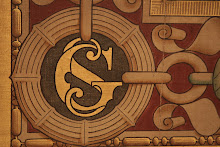We are our fathers. We are our children. This isn't to say there is no possibility for better, just that it's damn hard.
You can't really understand the sacrifices of your parents until you have children. Just when your life gets going -- you're old enough to have a job, drive a car, have friends and a romance -- just when you think "wouldn't it be nice..." you suddenly get this really noisy and demanding little creature to take care of. Unlike everything else you've had, this little guy has no instruction manual, no on/off switch, no warranty or service contract. You are now on full-time parenthood 24 hours a day for the next 18 years or so.
If you are conscientious enough, your children become the center of your world, otherwise they are an obstacle to whatever the center of your world is. Either way, you suffer: supreme sacrifice or supreme guilt. As long as a parent lives, they will be forever changed by this unique form of suffering. And this was the same for their parents, and their grand-parents, and their parents through beginningless time. The endless loop from conception to birth to adulthood to conception, the chicken-and-egg routine of life, belies not so much a linear chain as it does the interrelatedness of all humanity as siblings in a huge family. As grand as that sounds, it's just another way of saying we are who we are, nothing more or less.
I saw a bumper sticker today: We learn from history that we never learn from history. This is so true! We think we are smarter than those that went before us. The truth, of course, is we are the same people, using different tools, but still fundamentally the same people as our predecessors. In families this is especially true. You could call this statement the maxim of the eternal parent.
I am my father's son, and he his father's son. Each of us believed we would grow up to be different: better, smarter than our own parents; more loving, stronger. Each of us made small steps, perhaps mostly invisible to our spouses and children. But in times of difficulty we fall back on what we learned from our fathers: we become stoic, analytical, silent. This is what we learned from our fathers during times of difficulty in our childhood, and it is part of who we are. But our kids can't see that; they hear a loud voice and cower, just as we did when we were kids; they try to impress us, just as we struggled to prove ourselves. My dad and I. His father and him. Me and my children.
Through the vehicle of parenthood we learn there is no such thing as free choice, nor is there such thing as predetermined life. My kids are here, now, each an organ plucked from their mother to blossom into full organisms with their own unique beauty, desires, foibles and passion. Yet they are unquestionably still a part of me, my wife, our parents and grand-parents, and thus related to everyone. Nature versus nurture wasn't a fight; our nature is to nurture, and nurture is natural. It isn't a question of free choice or predestination, but rather an unbroken interconnected web of life. It's just hard to be mindful of this when your kid won't do his homework, or knocks the TV to the floor.
So how do you stop the promotion of a bad idea through this interconnected web of life? Is it simply an incremental process that will take another thousand years to sort out? Or is progress itself an illusion, and really you have up generations and down generations? I'll let you know when I have grand-kids.
Subscribe to:
Post Comments (Atom)




1 comment:
Ahh..you have grasped a thread of family life's continuum resulting in a mother's pride for your thoughtful process.
My generation raised children by comparison to others, putting our questions in hiding. You have surfaced the questions writing it down for your children to ponder when they reach adulthood....a wonderful gift to them.
Keep juggling, questioning because someday you will hear your own children's thoughts as I hear yours and find contentment that I did something right to have such a caring, thoughtful son.
Post a Comment